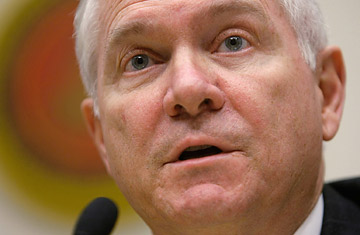
U.S. Defense Secretary Robert Gates testifies before the House Armed Services Committee on April 15.
If Defense Secretary Robert Gates has his hands full fighting wars in Afghanistan and Iraq, he didn't show it Monday morning when he fired a volley at his own Air Force for doing too little in both war theaters. Gates' comments ricocheted at supersonic speed around the Pentagon and across broader defense networks, as officers — and contractors — tried to parse their implications. His bottom line: The Air Force ought to be less concerned with buying more $350 million F-22 fighters for use in future wars that may never happen, and do more to deliver what is needed to fight the wars currently under way "while their outcome may still be in doubt."
Gates, himself a former Air Force officer (he served from 1967-69 in the Strategic Air Command), told young officers at Maxwell Air Force Base that the nation needs new ways of thinking about warfare. Gates may still be smarting from the fact that when he was CIA chief in 1992, the Air Force refused to invest in a spy drone because it didn't have a pilot. The same kinds of disputes, most notably in the Air Force, persist today over Iraq and Afghanistan. "I've been wrestling for months to get more intelligence, surveillance, and reconnaissance assets into the theater," he said at the Montgomery, Ala., base. "Because people were stuck in old ways of doing business, it's been like pulling teeth. While we've doubled this capability in recent months, it is still not good enough."
To the horror of some in the Air Force, Gates cited the late John Boyd, who attained the rank of Air Force colonel, as an example young officers should emulate. Gates called him "a brilliant, eccentric and stubborn character" who had to bulldoze his way through the Air Force hierarchy to launch the F-16 fighter, now regarded as perhaps the best value in the skies. Gates lionized Boyd for telling colleagues they could think in traditional Air Force ways that "will get you promoted and get good assignments," or do the right thing "and do something for your country, and for your Air Force, and for yourself." The Defense Secretary added that "an unconventional era of warfare requires unconventional thinkers." Gates made clear change won't be easy for the Air Force, whose key victories, he suggested, happened long ago. "The last time a U.S. ground force was attacked from the sky was more than half a century ago," he noted, "and the last Air Force jet lost to aerial combat was in Vietnam."
Air Force officials, upset by Gates's comments, say they have given him as much surveillance capability as they have. And they suggest that his statements are based on a misunderstanding that stems from a dearth of Air Force officers at the highest levels of the Pentagon's Joint Staff. "This fight has been going on since 1947," when the Air Force was created, says one recently departed Air Force officer. "The Army always wants more [such assets] — they're never satisfied."
But the Air Force may have been its own worst enemy. A contract awarded to Boeing for a new fleet of aerial tankers had to be rebid after the corruption involved in the decision had been exposed; the new bidding process was won by a European consortium. Twice in the past year, the service seems to have misplaced sensitive nuclear components, including nuclear-tipped missiles that flew across the U.S. unbeknownst to the chain of command. Its chief of staff, General Michael Moseley, was implicated last week in a bizarre plot to steer a $50 million contract to friends to develop ground-based entertainment for use during shows by the Air Force Thunderbirds precision-flying team. Gates mentioned none of this in his speech at Maxwell. Instead, he said he had "raised difficult questions with, perhaps, difficult answers," and encouraged the young Air Force officers "to be part of the solution and part of the future."
